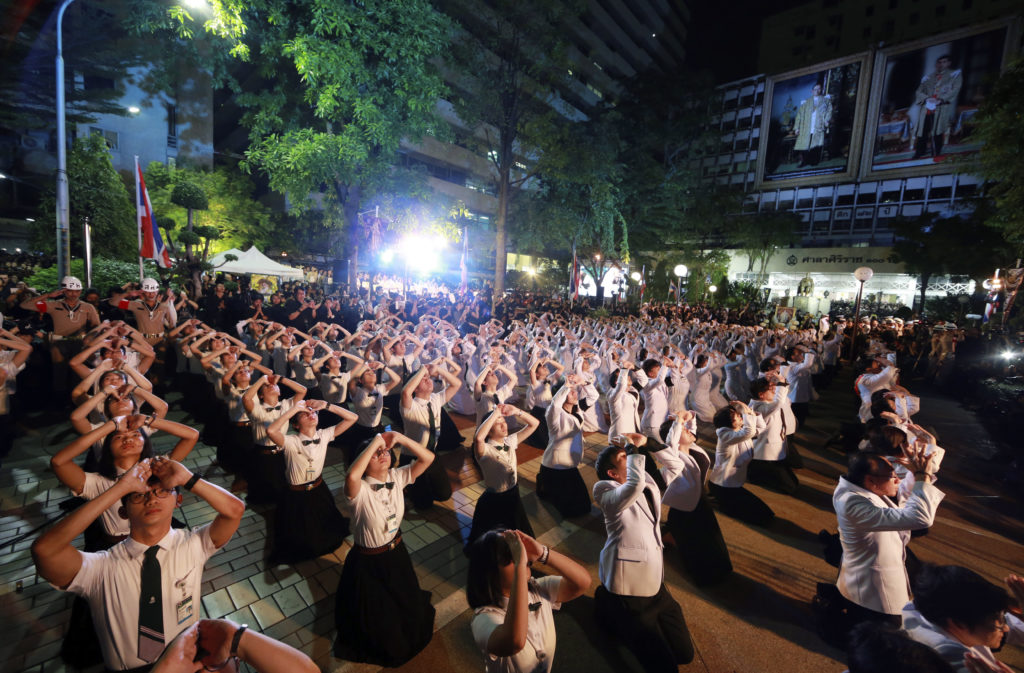
Thai mourners pray respect a portrait of the late Thai King Bhumibol Adulyadej, rear centre top left, and King Maha Vajiralongkorn Bodindradebayavarankun. rear top right, at Siriraj Hospital where he died in Bangkok, Thailand, Friday, Oct. 13, 2017. Bhumibol’s death at age 88 after a reign of seven decades sparked a national outpouring of grief and a year of mourning that will culminate with his cremation on Oct. 26. (AP Photo/Wason Wanivhakorn)
BANGKOK — Thais marked one year since the death of King Bhumibol Adulyadej with solemn ceremonies and acts of personal devotion Friday before an elaborate five-day funeral later this month.
Official commemorations of Bhumibol were organized at Bangkok’s Siriraj Hospital, where he died, and at Government House and the ornate royal palace. But many ordinary people showed their respects on the streets, at neighborhood markets and temples, kneeling before orange-robed monks to perform a Buddhist merit-making ritual.
“You see his achievements on TV sometimes, but now that he has passed we are learning about so many other things he has done for the country,” said Panicha Nuapho, 66, who traveled from a province 330 kilometers (205 miles) north of Bangkok to pay respects at Siriraj Hospital. “This is my final send-off,” she said, weeping.
Outside the hospital, mourners clad in black offered alms to a long procession of Buddhist monks and several thousand packed its grounds, joining nurses and doctors in prayers as monks chanted over loudspeakers.
Bhumibol’s death at age 88 after a reign of seven decades sparked a national outpouring of grief and a year of mourning that will culminate with his cremation on Oct. 26. More than 12 million people, or nearly a fifth of Thailand’s population, have visited the palace throne hall where the king’s body has been kept for the past year.
The reverence Bhumibol inspired was in part the result of decades of work by palace officials to rebuild the prestige of the monarchy, which lost much of its influence after a 1932 coup ended centuries of absolute rule by Thai kings. That effort built an aura of divinity around Bhumibol, who was protected from criticism by draconian lese majeste laws, but the king was also genuinely adored for his charitable work, personal modesty and as a symbol of stability in a nation frequently rocked by political turmoil.
Thailand’s military government has asked the public to observe 89 seconds of silence Friday at 3.52 p.m., marking the official time of Bhumibol’s death in what Thai culture emphasizes was his 89th year.
At the same time, nine elephants powdered an auspicious white will kneel with their handlers in memory of Bhumibol in the ancient royal capital Ayutthaya outside of Bangkok.
His son, King Maha Vajiralongkorn Bodindradebayavarankun, knelt before a portrait of the late king and Queen Sirikit at Dusit Palace and is expected to preside over merit-making ceremonies on Friday and Saturday. Many people flocked to the palace area and left flowers beneath a giant portrait of Bhumibol.
Prime Minister Prayuth Chan-ocha, the head of Thailand’s ruling junta which seized power in a 2014 coup it was said was necessary to restore political stability, oversaw ceremonies at Government House.
The military, which frames itself as the monarchy’s most important defender, has used Thailand’s harsh lese majeste laws with increased frequency in the past three years. The law allows for prison of up to 15 years for anyone found guilty of insulting senior members of the royal family.
Supporters of the law argue that the monarchy is a sacred pillar of Thai society and must be protected at all costs. Critics say the law is being used to silence dissent.

